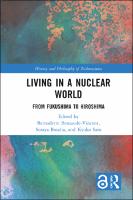Living in a Nuclear World
Proposal review
From Fukushima to Hiroshima
Contributor(s)
Bensaude Vincent, Bernadette (editor)
Boudia, Soraya (editor)
Sato, Kyoko (editor)
Language
EnglishAbstract
The Fukushima disaster invites us to look back and probe how nuclear technology has shaped the world we live in, and how we have come to live with it. Since the first nuclear detonation (Trinity test) and the bombings of Hiroshima and Nagasaki, all in 1945, nuclear technology has profoundly affected world history and geopolitics, as well as our daily life and natural world. It has always been an instrument for national security, a marker of national sovereignty, a site of technological innovation and a promise of energy abundance. It has also introduced permanent pollution and the age of the Anthropocene. This volume presents a new perspective on nuclear history and politics by focusing on four interconnected themes–violence and survival; control and containment; normalizing through denial and presumptions; memories and futures–and exploring their relationships and consequences. It proposes an original reflection on nuclear technology from a long-term, comparative and transnational perspective. It brings together contributions from researchers from different disciplines (anthropology, history, STS) and countries (US, France, Japan) on a variety of local, national and transnational subjects. Finally, this book offers an important and valuable insight into other global and Anthropocene challenges such as climate change.
Keywords
Social and cultural history;General and world historyDOI
10.4324/9781003227472ISBN
9781003227472, 9781032130668, 9781032130637, 9781000541557Publisher
Taylor & FrancisPublisher website
https://taylorandfrancis.com/Publication date and place
2022Imprint
RoutledgeSeries
History and Philosophy of Technoscience,Classification
Social and cultural history
General and world history


 Download
Download